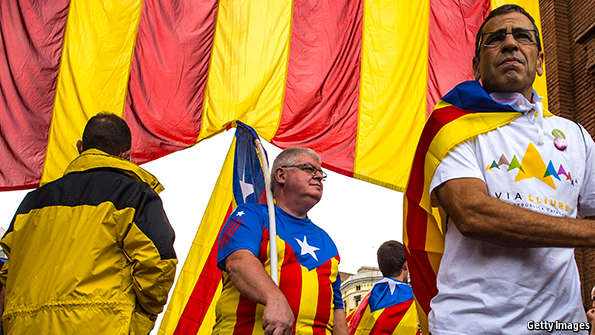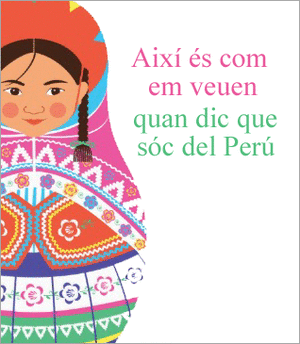
CATALONIA celebrates its national day on September 11th, but the tranquil northern city of Girona kicks off the festivities the night before with a torchlight procession through the narrow streets of the city's medieval old quarter. Marchers cross the River Oñar to the sound of drums and reedy flageolets. Many carry the gold, red and blue flag of the Catalan indepence movement; national day has long been a rallying point for separatists. In past years, marchers in Barcelona have pulled stunts like taping a banner reading "Spanish Embassy" over the local offices of the federal government. This year the day marks the start of the most important election campaign in Catalonia's 36 years of limited self-government—one that threatens to transform this wealthy north-eastern corner of Spain into the European Union's first secessionist state.
Catalonia's regional president, Artur Mas, has billed the September 27th elections as a plebiscite on independence, despite the refusal of Spain's federal government to recognise it as such. Mr Mas's centre-right Catalan Democratic Convergence (CDC) party has joined with the left-wing Catalan Republican Left (ERC) and grass-roots separatist movements to present a joint list of candidates. They say that if they and other separatists win a majority of seats in the Catalan parliament, they will declare independence within 18 months.
Separatism in Catalonia is partly rooted in culture and history. The region has its own language, and was not fully incorporated into Spain until the early 18th century. Its national day commemorates the defeat on September 11th, 1714 of the defenders of Barcelona at the hands of the Spanish army of King Philip V, ending the War of the Spanish Succession. (Catalans had backed a rival candidate for the monarchy.) As part of the celebrations this year, Mr Mas laid flowers at a monument in Barcelona to Rafael Casanova, who led the city's resistance; secessionist Catalans see the defeat as the start of three centuries of Spanish oppression.
Debt is forcing Spanish family firms to open up
Other arguments are more pragmatic. Catalonia constitutes 16% of Spain's population but almost a fifth of its economy. Separatists claim that, with no outflow of tax money to poorer regions of Spain, there will be more to spend locally. This is a simplistic view; an independent Catalonia would need to re-apply for membership in the EU and the euro, and would have an unproven record in credit markets. "The Europe of the member states is not designed for its members to fragment," warns Catalan businessman Juan Rosell, who heads Spain's employers federation. An advisor close to Spain's prime minister, Mariano Rajoy, says secession would be "ruinous" to both Catalonia and Spain.
Yet Lluis Llach, who heads the separatist list of candidates in Girona province, says popular pressure has left Mr Mas with few options. "This is not about politicians. It is a people's movement," he insists. Mr Llach, a musician whose Catalan-language protest anthems were sung across Spain in the dying days of General Francisco Franco's dictatorship in the 1970s, says that he became a full-blown separatist only after Spain's constitutional court struck out part of the region's statute of self-government in 2010. That dashed his dream that the constitution might allow Spain to become a "nation of nations", in which Catalonia, the Basque region and Galicia would be recognised as separate and different. It was also the moment in which Catalan separatism began to snowball. Polls show marginally less than half of Catalans support independence, making the next two weeks of campaigning crucial.
The festivities closed with an immense rally in Barcelona stretching five kilometres to the gates of Catalonia's parliament building. Organisers claimed it had drawn a million people. The pro-independence parties are disciplined and well-organised: busloads of supporters descending on Barcelona from Girona knew beforehand exactly where they should stand. They also know how to have fun. Human towers, folk dances and other Catalan traditions kept the crowds entertained until the demonstrators performed an elaborate choreography with coloured cards that started precisely at 5:14pm (17:14 in European time, recalling the year of Barcelona's defeat).
Opponents of independence, meanwhile, complain of a climate of intimidation. "There is fear in Catalonia that prevents people declaring that they want to maintain their status as both Catalans and Spaniards," says anti-separatist campaigner Josep Ramon Bosch. Spain's main parties have been sidelined in the elections; neither Mr Rajoy's Popular Party nor theSocialists look set to gain more than 13% of the vote. Instead the task of battling the separatist movement has largely fallen on the shoulders of two new insurgent parties, the centre-right Ciudadanos party and a coalition called "Yes Catalonia Can" led by the left-wing Podemos party. A poll by Spain's state pollster on September 10th suggested the separatists were headed for victory. The consequences would not be as trouble-free as they expect. A few years down the road, rather than celebrating the day they lost independence, many Catalonians may be mourning the day they gained it.
Catalonia's regional president, Artur Mas, has billed the September 27th elections as a plebiscite on independence, despite the refusal of Spain's federal government to recognise it as such. Mr Mas's centre-right Catalan Democratic Convergence (CDC) party has joined with the left-wing Catalan Republican Left (ERC) and grass-roots separatist movements to present a joint list of candidates. They say that if they and other separatists win a majority of seats in the Catalan parliament, they will declare independence within 18 months.
Separatism in Catalonia is partly rooted in culture and history. The region has its own language, and was not fully incorporated into Spain until the early 18th century. Its national day commemorates the defeat on September 11th, 1714 of the defenders of Barcelona at the hands of the Spanish army of King Philip V, ending the War of the Spanish Succession. (Catalans had backed a rival candidate for the monarchy.) As part of the celebrations this year, Mr Mas laid flowers at a monument in Barcelona to Rafael Casanova, who led the city's resistance; secessionist Catalans see the defeat as the start of three centuries of Spanish oppression.
Debt is forcing Spanish family firms to open up
Other arguments are more pragmatic. Catalonia constitutes 16% of Spain's population but almost a fifth of its economy. Separatists claim that, with no outflow of tax money to poorer regions of Spain, there will be more to spend locally. This is a simplistic view; an independent Catalonia would need to re-apply for membership in the EU and the euro, and would have an unproven record in credit markets. "The Europe of the member states is not designed for its members to fragment," warns Catalan businessman Juan Rosell, who heads Spain's employers federation. An advisor close to Spain's prime minister, Mariano Rajoy, says secession would be "ruinous" to both Catalonia and Spain.
Yet Lluis Llach, who heads the separatist list of candidates in Girona province, says popular pressure has left Mr Mas with few options. "This is not about politicians. It is a people's movement," he insists. Mr Llach, a musician whose Catalan-language protest anthems were sung across Spain in the dying days of General Francisco Franco's dictatorship in the 1970s, says that he became a full-blown separatist only after Spain's constitutional court struck out part of the region's statute of self-government in 2010. That dashed his dream that the constitution might allow Spain to become a "nation of nations", in which Catalonia, the Basque region and Galicia would be recognised as separate and different. It was also the moment in which Catalan separatism began to snowball. Polls show marginally less than half of Catalans support independence, making the next two weeks of campaigning crucial.
The festivities closed with an immense rally in Barcelona stretching five kilometres to the gates of Catalonia's parliament building. Organisers claimed it had drawn a million people. The pro-independence parties are disciplined and well-organised: busloads of supporters descending on Barcelona from Girona knew beforehand exactly where they should stand. They also know how to have fun. Human towers, folk dances and other Catalan traditions kept the crowds entertained until the demonstrators performed an elaborate choreography with coloured cards that started precisely at 5:14pm (17:14 in European time, recalling the year of Barcelona's defeat).
Opponents of independence, meanwhile, complain of a climate of intimidation. "There is fear in Catalonia that prevents people declaring that they want to maintain their status as both Catalans and Spaniards," says anti-separatist campaigner Josep Ramon Bosch. Spain's main parties have been sidelined in the elections; neither Mr Rajoy's Popular Party nor theSocialists look set to gain more than 13% of the vote. Instead the task of battling the separatist movement has largely fallen on the shoulders of two new insurgent parties, the centre-right Ciudadanos party and a coalition called "Yes Catalonia Can" led by the left-wing Podemos party. A poll by Spain's state pollster on September 10th suggested the separatists were headed for victory. The consequences would not be as trouble-free as they expect. A few years down the road, rather than celebrating the day they lost independence, many Catalonians may be mourning the day they gained it.









0 comentaris:
Publica un comentari a l'entrada